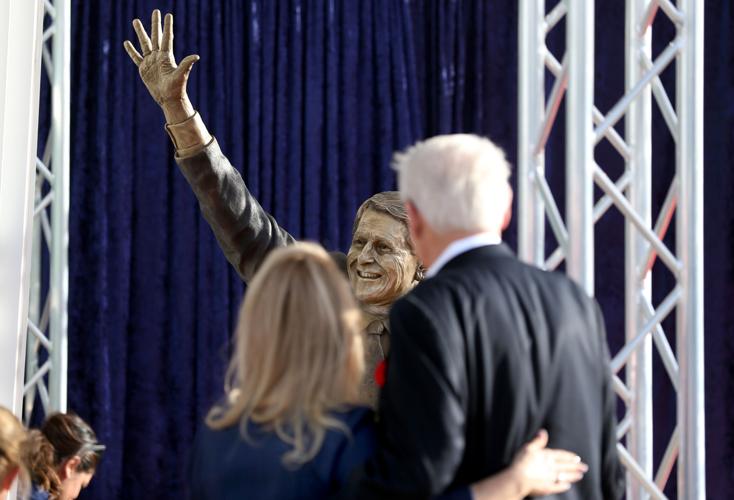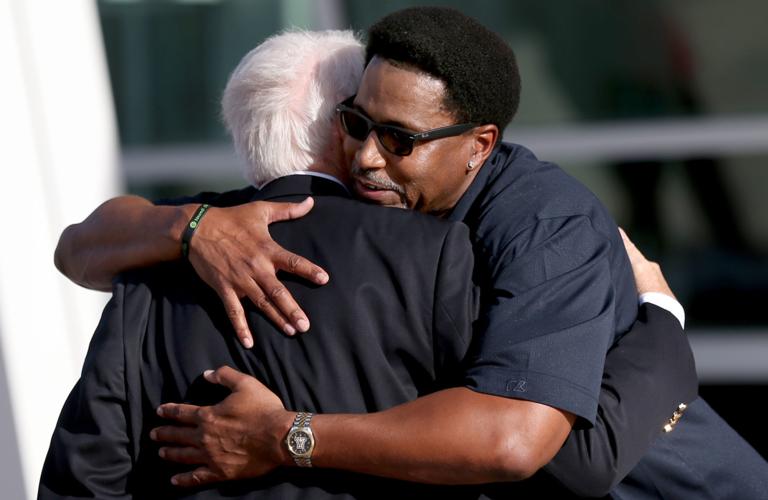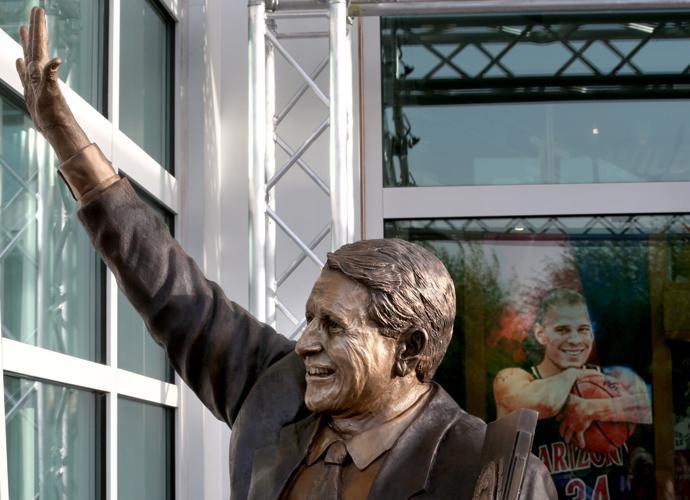Rex Hughes died two years ago in small-town Nipomo, California — dead of cancer at 77 — and when Lute Olson got the news you can almost imagine what went through his mind.
Under different circumstances, that could’ve been me.
In 1969, Rex Hughes was the basketball coach at Long Beach City College, a former high school coach of note in Southern California, the kind of on-the-rise coach that Olson hoped to be.
In 1969, the 35-year-old Olson was coaching at Marina High School, living in Fountain Valley with his wife Bobbi and five kids. He supplemented his income by working part-time at the Wright Driving School, teaching 16-year-olds how to drive.
Olson later told the Los Angeles Times “I wanted a college job and at 35 I felt I couldn’t wait much longer.”
In perhaps the biggest break of Olson’s coaching career, he learned that Hughes was leaving LBCC to become an assistant coach at Nebraska. The days of driving school would come to an end if Olson could get the LBCC job.
He could sell his 1964 Nash Rambler, quit his summer job driving a gas truck for Texaco, and change the course of his life.
“What eventually got to me at Marina High School was the mandatory extra-duty routine — spending hours on campus policing the students, baby-sitting as a lunch-room monitor, checking the rest rooms for smokers,” Olson told the Times after he was hired to replace Hughes at LBCC 49 years ago this month.
“Had it not been for those duties, I probably would have stayed in high school teaching the rest of my life.”
There would have been no statue outside of McKale Center. There would have been no McKale Center in his life. No Final Four at Iowa. No Naismith Hall of Fame. It’s the basketball version of George Bailey in “It’s A Wonderful Life,” getting a glimpse of what life would have been like without him.
In Olson’s case, had he not been hired at LBCC in 1969, he might’ve enjoyed a retirement party at the Marina High cafeteria, or some other SoCal school, about the time Arizona won the 1997 national championship.
Rex Hughes won 27 games as a head college basketball coach. Olson won 761.
Once Olson got his chance at Long Beach City College, everything changed. He made the most of an opportunity that Hughes could not.
The Vikings won the 1971 state junior college championship. A year later they finished second. Olson was on the map. He worked all the Southern California coaching clinics, sharing the marquee with men like Stanford Rose Bowl coach John Ralston and USC basketball coach Bob Boyd.
After four years at LBCC, 104-22 overall, people noticed. When Jerry Tarkanian left nearby Top 10 power Long Beach State, Olson was the easy choice to take the next step. In retrospect, the Los Angeles Times headline announcing the transaction makes you chuckle.
The Rookie
Replaces
The Master
Olson was the rookie. Tarkanian the master.
“Olson’s manner commands respect,” the Times wrote. “He is self-assured to the point of seeming imperturbable.”
Twenty years later, Lute and Tark ruled college basketball in the West, Olson at Arizona, Tark at UNLV. No one needed to use full names to identify either coach.
Both were masters. Both were, shall we say, imperturbable.
Five years ago, UNLV erected a statue of the 83-year-old Tarkanian. On Thursday, Arizona unveiled a statue of the 83-year-old Olson.
How fitting.
Thursday’s ceremony was understated. It was neither the time nor place for Olson to reflect about how far he had come, nor about how his career took a much different path than that of his former contemporary, Rex Hughes.
“This means the world to me,” Olson said.
Everything else speaks for itself, now and for perpetuity.
For decades and longer, those who enter McKale Center will stop at the statue of Olson and reflect on the school’s glory years, 1983-2007. They will know the story of Steve Kerr, the final recruit of Olson’s first season, and they will have seen long-ago footage of Miles Simon cradling the basketball, champions at last, in the final seconds of the 1997 Final Four.
Most of the other defining stories of Arizona’s rise as a basketball juggernaut will be forgotten.
In November 1983, Olson was being paid a base salary of $60,000 on a one-year contract to restore Arizona’s basketball program. So few people cared that Olson arranged to hold a scrimmage at Nogales High School in hopes it would sell a few more tickets at McKale Center.
Olson’s team managers arranged for a hundred sandwiches to be made and placed on tables inside the small high school gymnasium. Maybe free food would draw an audience for a basketball team that had gone 4-24 a year earlier.
After the Wildcats scrimmaged that day, Olson stood at mid-court and spoke to a small gathering of fans at the Nogales gymnasium.
“I would advise you to get your tickets now,” he told them. “They won’t last long.”
Twenty-five years earlier, at Marina High School, it had been Olson who had been on duty making sure those kids wouldn’t sneak an extra sandwich.
By 1983, his life had changed. He was the man they had come to see. He is the man who sold the tickets, then as now.






